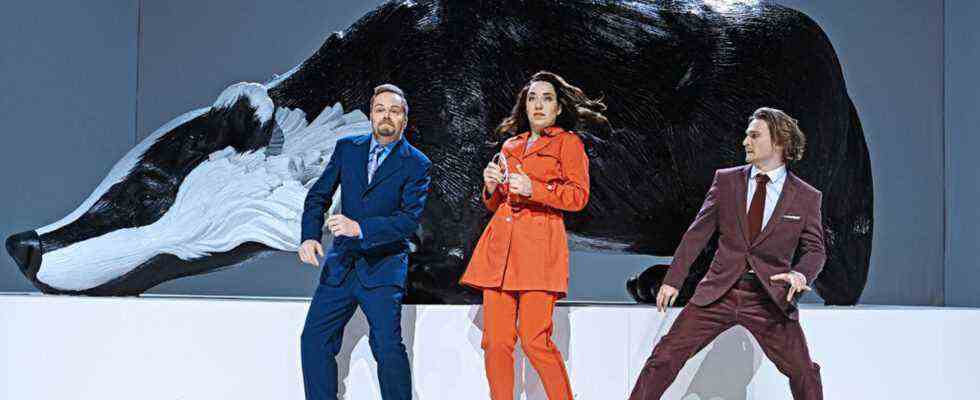Status: 01/14/2022 2:59 p.m
The Wirecard scandal comes to the stage: “Villa Alfons” premieres at the Staatstheater Mainz. The piece about economic fraud has to struggle with credibility – because the truth is so unbelievable.
Wirecard should give Germany prestige in the global FinTech industry. But then the DAX-listed financial service provider became a gigantic embarrassment: for auditors, for supervisory authorities, for public prosecutors, for top politicians. 23 billion euros in damage, small investors deprived of their savings and whistleblowers who were targeted by German investigators as well as by semi-silky figures. A sad indictment that is now coming to the theater stage under the title “Villa Alfons”. As a comedy.
For the author, the playwright David Gieselmann, the catastrophe as a comedy is not a contradiction in terms: “The actors in a comedy don’t know that they are the actors in a comedy. That’s precisely what’s dramatic.”
“Villa Alfons” at the Staatstheater Mainz does not amuse itself at the victims of the Wirecard scandal, but at the being and, above all, appearance of the bankers. “A lot of stage comedy comes from the constellation that the audience knows more than the person on stage – for example about the lover in the closet.” In the case of Wirecard, Gieselmann made this constellation his own and quoted a character by Woody Allen: “Comedy is tragedy plus time.”
Open wounds of the financial scandal
So time heals all wounds in such a way that you can laugh about it later? The healing process in the Wirecard scandal is far from over a year and a half after the collapse: Wirecard’s second man, Asia boss Jan Marsalek – in the production he is called “Jens Marlicek” and is played by David Meyer – is still on the run international arrest warrant and access to millions of euros. Against CEO Markus Braun – baptized in the play “Markus Schwartz” and played by Klaus Koehler – no charges have been filed in the real world. The presumption of innocence, which applies until a conviction, makes it impossible for Wirecard victims to conclude a deal with this veritable “bad bank”. The Wirecard wound is still open.
Nevertheless, you can laugh about what is happening in the eponymous “Villa Alfons”, that feudal accommodation in one of the most important urban boulevards in Munich and “alternative company headquarters”, the real setting and in the performance. Rental price: 56,000 euros. In the month. Here Marlicek meets obscure figures in order to achieve 25 percent annual growth for “Instacard”, as Wirecard was christened in the play. To do this, it means buying Klitschen, deceiving BaFin officials or having a certain “Karl-Theodor von und zu Schlechtental” deliver a eulogy.
The absurdity of reality on stage: The ensemble of “Villa Alfons” in the Staatstheater Mainz.
Image: Andreas Etter
The stage design is dominated by a badger, as big as an elephant and symbol of the German share index. Schwartz wants to climb it. Because: “Much better than sex: We are in the German share index,” he sings from the stage. “Into the DAX”, “out of the mediocre sauce”. In the end – so much can be revealed – he also gets into the badger, very charmingly staged and different than expected.
Wirecard acted. On the one hand, this makes it easy for a dramatist to imagine the protagonists’ thoughts, since the theater lives on stories from an illusory world just as much as the impostor: the payment service provider bought companies in distant countries overpriced as a backdrop for more legroom on the balance sheet – not real, but impressive; Picturesque sales figures caused the theatrical thunder on the trading floor; and the cast ranged up to testosterone-filled boxing promoters who, together with lawyers but also prosecutors, intimidated the critics; or a senior executive who made no secret of his anti-Semitism.
Fraud with theatrical gestures
“First we read the text by David Gieselmann and were absolutely impressed by what he came up with. And then we found out that he didn’t come up with it at all. We sat there and were absolutely shocked,” says the actress Kruna Savić, who, as journalist Annegret Lopez, guides her through Wirecard’s journey through time like a conférencière.
The idea and initiative to bring this unbelievable material to the stage initially came from the Staatstheater Mainz, explains director Markus Müller: “We believe it is important to bring new contemporary material to the stage, especially when themes move us.” When the house then asked Gieselmann to implement it, he was initially skeptical because of the complicated financial issue. “At some point, however, I saw that the essential gesture of fraud involving Wirecard is actually a theatrical one – namely that of making claims. At Wirecard, transactions, profits, companies, capital, accounts and so on were claimed, and we also make claims on stage . Using this parallel appealed to me.”
“Nobody believes that”
This parallel threatens to turn from a blessing to a curse, but the comedy shouldn’t become a slapstick. For example, the fact that Wirecard is said to have hired actors who played bank staff so that financial auditors would believe they were actually in a bank that manages capital for Wirecard – that would immediately be deleted from any sensible editing in one piece, Gieselmann describes. “Nobody believes that! But this is exactly what happened, and it was also believed. In this piece, the most absurd things that are told are those that happened exactly like this.”
So “Villa Alfons” means laughing and shaking heads for two hours for the audience. Then anger and resentment. About the fact that the rule of law made all this possible and lobbied as far away as China. “Villa Alfons” is worth seeing – also for finance experts: Mainz has an S-Bahn connection to the neighboring financial center Frankfurt. BaFin is also based there.

